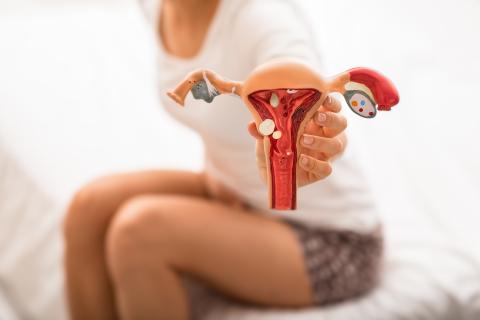International Endometriosis Day

Endometriosis affects some 10% of women of childbearing age, and in many cases diagnosis is still delayed. There is an endometriosis clinic at the Europe Hospitals to offer patients multidisciplinary, coordinated care. We spoke to Dr Frédéric Grandjean, the gynaecologist in charge of the Endometriosis Clinic.
Treatment depends on the patient's complaints. ‘If she only comes in for pain, we can try to relieve her by giving her a conventional contraceptive pill or a mini-pill, which will stop her periods. There has recently been a new treatment - Relugolix (Ryeqo®) - which induces a state similar to temporary cessation of ovarian function while administering a female hormone, so that the patient does not have the inconvenience of hot flushes, etc. This drug is available in Belgium and reimbursement has just been approved for this indication. It's a treatment that used to be given for uterine fibroids,’ says Dr Grandjean.
‘The other option is surgery, which consists of removing the endometriosis lesions that can be seen on the various organs. Finally, if the patient is infertile, we will opt for surgery and/or referral to a Medically Assisted Reproduction centre’, continues the gynaecologist.
Multidisciplinary treatment
Because it can affect different organs, this disease needs to be treated by a multidisciplinary team. Psychological support may also be necessary, as these are often patients who have been in pain for years. This pain has sometimes been ignored or under-diagnosed.
‘As part of the weekly pre-op staff meetings between gynaecologists, we invite the colleague from the discipline involved to present the patient's endometriosis. If, for example, the patient suffers from endometriosis near the bladder, we discuss it with the urologist and, if necessary, he can come and help with the surgery’, explains Frédéric Grandjean.
Not always easy to diagnose
If patients are sometimes left in the dark about the diagnosis for months or even years, it's partly because the condition is not always easy to diagnose. ‘On vaginal examination, two types of endometriosis can already be palpated (deep rectovaginal endometriosis and endometriomas), which can be identified and distinguished by MRI. That said, sometimes I don't feel anything on clinical examination, but I nevertheless ask for an MRI scan, because the patient has symptoms that worry me. And sometimes it's on the MRI that we see lesions higher up,’ notes Dr Grandjean.
‘It can also happen that the patient has worrying complaints, but nothing is seen either on clinical examination or on MRI, and we are unable to relieve her with medication. In this case, we can suggest a diagnostic laparoscopy to see if there are any spots of endometriosis that would not be visible on MRI, and we can then, if necessary, treat her straight away,’ adds the gynaecologist.
A multidisciplinary team
The team at the Endometriosis Clinic is made up of gynaecologists specialising in endometriosis, a psychologist with a mother-child and maternity focus, an algologist-anaesthetist trained in perineum and perineal pain, a urologist, a digestive surgeon, radiologists and a dietician.
Any gynaecologist can, of course, prescribe a pill to relieve a patient suffering from endometriosis. However, not all gynaecologists operate on endometriosis. At the Europe Hospitals, it is Drs Grandjean, Waterkeyn, Bentin, Pire, Delbar, Vander Heyden and Grauwen who treat the condition surgically.

